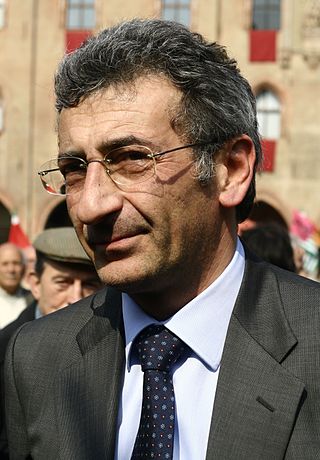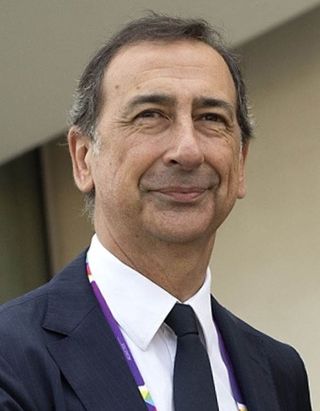
Flavio Delbono is an Italian politician and economist. He served as the mayor of Bologna from 25 June 2009 until 28 January 2010, when he was forced to resign as he was being investigated for crimes such as embezzlement, fraud and aggravated abuse of office following allegations made by his former lover.

The Mayor of Bologna is an elected politician who, along with the Bologna’s City Council, is accountable for the strategic government of Bologna, the regional capital of Emilia-Romagna, Italy.

The 2011 Italian local elections were held on 15–16 May, with a second round on 29–30 May. In Italy, direct elections were held in all 1,177 municipalities and 11 provinces: in each municipality (comune) were chosen mayor and members of the City Council, in each province were chosen president and members of the Provincial Council. Of the 1,177 municipalities, 30 were provincial capital municipalities and only 105 had a population higher than 15,000 inhabitants.

Virginio Merola is an Italian politician. Merola is a member of the Democratic Party and former Mayor of Bologna.

Municipal elections were held in Rome on 13 and 27 May 2001 to elect the Mayor of Rome and 60 members of the City Council, as well as the nineteen presidents and more than 400 councillors of the 19 municipi in which the municipality was divided. The first round of the elections occurred on the same date of the national general election.

Municipal elections were held in Bologna on 6–7 and 21–22 June 2009. The centre-left candidate Flavio Delbono was elected mayor at the second round with 60.77% of votes.

Municipal elections were held in Milan on 5 and 19 June 2016 to elect the Mayor and the 48 members of the City Council, as well as the nine presidents and 270 councillors of the nine administrative zones in which the municipality is divided, each one having one president and 30 councillors.

The mayor of L'Aquila is an elected politician who, along with the L'Aquila City Council, is accountable for the strategic government of L'Aquila in Abruzzo, Italy, capital city of the region.

The 2020 Italian local elections were held on different dates; they were originally scheduled to take place in May 2020, together with the 2020 regional elections, with a second round on June, but they were delayed on 20 and 21 September with a second round on 4 and 5 October due to the coronavirus pandemic in Italy. Direct elections were held in 1,172 out of 7,904 municipalities; in each of these, the mayor and the members of the City Council are going to be elected. Of the 1,172 municipalities, 18 are provincial capitals.

The municipal elections in Bologna took place on 3 and 4 October 2021. The incumbent Mayor of Bologna was Virginio Merola of Democratic Party, who won the 2016 Bologna municipal election. The centre-left candidate Matteo Lepore won in a landslide with 62% of votes, becoming the most voted mayor since the introduction of direct elections in 1995.

The 2021 Italian local elections were held on 3 and 4 October. Originally scheduled as usual between 15 April and 15 June with run-offs two weeks later, the Government of Italy announced on 4 March that they were postponed to after the summer due to the COVID-19 pandemic in Italy. Elections took place in 1,293 out of 7,903 municipalities, 20 of which are provincial capitals. Mayors and city councils have been elected for the ordinary five-year terms, lasting till 2026.









